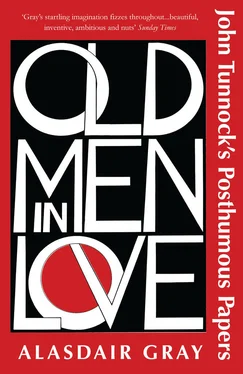“Yes. They are all members of our family and share its blessings.”
“Do you take the service needed in the house, each in turn, like the Brethren and Sisters of Mount Lebanon?” (I saw a faint smile ripple on the servant’s face.)
“Oh no,” broke in upon us Sister Ellen; “we do nothing of that kind; our people serve us; but they do it for love.”
“Do you mean that they serve you without being paid?”
The only reply to my question was a laugh from the lady and a grin from the domestic.
“Among these sixty inmates, how many are male and female? How many are young, how many grown up?”
“The sexes are nearly equal,” answered Thomas, “there are no children.”
“None at all?” I asked, thinking of the Great Manifestation, and what was said to have come of it.
“You do not understand the life we live here in the Lord. Those who married in the world aforetime now live as though they had not. We are as the angels in Heaven and have no craving after devil’s love.”
“What do you wish me to understand as devil’s love?”
“Love that is of the flesh — all love not holy, spiritual, and of God.”
“Have I not just seen a child through the church window? A little girl playing on the lawn?”
Prince seemed to be dreaming again. Thomas said with deep emotion, “She is a child of shame — a broken link in our line of life — Satan’s offspring in the flesh.”
A look of anguish clouded all their faces except Sister Zoe’s, whose sweetly serene countenance was quite unmoved.
“The work of that time,” put in Sister Ellen with a sigh, “was the saddest thing I have ever known. For a whole year we lay in the shadow of death, and near to hell; but God wrought out His purpose in us. It was a bitter time for all but most for our Belovéd.”
Poor little girl!
“Your rule of life is now — a rule of abstinence?”
“It is the rule of angels,” answered Prince. “we live in love, but not in sin; for sin is death and our life in the Lord is eternal.”
“Yet surely all men die?”
“Yes,” said Thomas, “they have mostly done so; but death is subject to the Lord in whom we live. We shall not die. We have no such thought.”
“But some among you have passed away; Louisa Nottidge, for example?”
“Yes, some erred and the Lord took them; but many examples do not make a necessary rule. If I saw the valley outside our Abode choking with ten thousand corpses, the sight would not convince me that I too would one day die.”
“Where do you put the departed ones?”
“Some are buried at the farm, some rest under the green lawn. We think that all bodies not saved eternally by Christ go back into the earth from which they sprang.”
“But you are all growing older! As more of you drop away you will be forced to see that death will come.”
“Not so,” said Belovéd, “we will never expect death. Death is a word that belongs to time.”
“But everyone lives in time.” “You live in time. We do not.”
“You see the sun rise and set,” I urged, “you know that yesterday was Friday, that tomorrow will be Sunday; that springtime passes and the harvest comes about.”
“Well, yes,” said Belovéd in a pitying tone, “we feel the flow you must take as your measure of time. It is no sign of change to us, who dwell for ever in the living God.”
Such is the Abode of Love. A dozen ardent clergymen, smitten with a passion to save souls, possessing power to warn and softness to persuade, after various grapplings with the world have left their posts and shut themselves up in a garden where they muse and dream, surrounding themselves with lovely women, eating from rich tables, pretending that their passions are dead, and waiting, in the midst of luxury and idleness, for the whole world to be damned!
Is this all? No; not quite all: in the meantime the reverend gentlemen play a game of billiards in what was once their church.


To the end of his life the Reverend Henry James Prince kept a strangely ageless look that attracted new followers as the original ones died. In 1892 he converted to his faith another equally charismatic Anglican priest, John Hugh Smyth-Pigott, then aged thirty. In London Smyth-Pigott repeated the Prince story of fifty years earlier by gaining a large congregation with a core of professional men (stockbroker, chartered accountant, tax collector, civil engineer, architect, master baker) and several hundred ardent female admirers. Like Prince’s early followers these combined to build for Smyth-Pigott and Prince a unique church, but much larger and more splendidly ornate, in what was then known as the “muscular Gothic” style. It was called The Ark of the Covenant, on Rookwood Road, Hackney. The cathedral-like spire is visible for miles around, and the beautiful stained-glass windows are designed by Walter Crane. This church opened with a service of dedication attended by Brother Prince in 1896. Every seat was crammed with eager followers, apart from some allocated to the press and public. After the dedication Prince finally retired for the last time to his Agapemone at Spaxton, Somerset.
In the last year of the 19 thcentury the chief Agapemone housekeeper sent word that the impossible seemed to be happening: Brother Prince was dying. Smyth-Pigott hurried to the bedside and found Henry almost unable to speak, but according to the few people present his last word was spoken to this, the most powerful of all his disciples. The word was “Belovéd!”
What follows is described by Kate Barlow, Smyth-Pigott’s granddaughter, in her book about him and how he prolonged the Agapemone into the 20 thcentury –
“Prince’s followers were confused, appalled and frightened by his death. When others had died it had been easy to dismiss their parting as a failure on their part, but Brother Prince? Surely not. It took all my grandfather’s considerable skill to soothe the confused faithful and at the same time get the old man laid to rest in the garden of the Somerset Abode of Love in what I was to know as Katie’s corner.” 51

TWENTY-NINE TUNNOCK'S DIARY 2006

I never listened consciously to popular songs but as a student heard them on juke boxes when every café and pub had them instead of television sets. Nowadays phrases from them come to mind for no apparent reason. I awoke this morning with the tune of these words in my head: Hey mister tambourine man sing a song for me, I’m lonely as can be, I’m lonely and I don’t know where I’m goin’. 52I was not lonely. I was cuddling Zoe which always makes me feel thoroughly happy and good. I had made my arms and body like a basket holding her, keeping her warm and safe and both of us at peace. Yes indeed.
Having completed Victorian English tale will I resume Classical Greek? Or Renaissance Italian? Or Scottish history from big bang till now? Where will I get the knowledge, strength, enthusiasmos 53 to continue one of these? As the second policeman says, this is a compound crux, an almost insoluble pancake. 54 Until a solution is found this diary must contain my furor scribendi . 55
Читать дальше
















